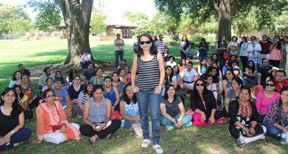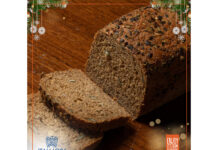
SUNNYVALE, CA: Rujuta Diwekar is possibly India’s most followed nutritionist, known as much for her A-list clientele (Kareena Kapoor, Alia Bhatt, Anupam Kher, Saif Ali Khan, Varun Dhawan) as for her unorthodox views on fitness and diets. She is known for her rather simple and straightforward approach to nutrition and fitness.
She met up with 200 of her ardent fans on July 8 at Ortega Park, Sunnyvale. Winner of the ‘Nutrition Award’ from Asian Institute of Gastroenterology, Rujuta is amongst the most qualified and sought after sports science and nutrition experts in the country and the author of 5 best-selling books on Nutrition and Exercise. She emphasizes on a blend of traditional food wisdom and modern nutritional science for a healthy body and mind, best reflected through the mantra – Eat local, think global.
Losing weight is not as important as staying fit, and celebrities need not always be role models, Diwekar told in the interview. Eating home-made food, local produce and seasonal fruits leads to regulated blood sugar, which further optimizes the functioning of all organs, making a person feel energetic as opposed to dull and lethargic, an effect of eating too much.
Her principle of eating small meals every two-three hours also boosts metabolism, because once the body is sure of getting its next meal soon, it willingly burns fat. She advocates on eating locally grown foods rather than adopting foods like quinoa, buckwheat etc. She urged her fans to reduce the carbon footprints by cutting down on usage of plastics.
What are some of the Indian super foods?
Ghee, rice and cashew nuts are some of the Indian super foods which I advocate people to indulge in guilt-free. The anti-oxidants in ghee make it the miraculous anti-wrinkling and anti-ageing therapy you were searching for.Ghee improves your satiety signal and ensures you eat the right amount of food.
Your insights on rice?
Eat your rice the way you like it, eat it as often in the day as you want and eat it in quantities which will leave you feeling light and energetic, and enjoy the wonders it will have on your body. It promotes growth of pro-biotic bacteria, eases bowel movement and rids you of bloating. It has essential amino acids like methionine, which when consumed with dal, for example, completes the amino acid profile of the meal. It allows for better assimilation of Vitamin D and calcium.
So when a person comes in for a consultation, how do you develop a plan with them?
Choosing a diet should be like selecting your life partner.
I’ve been fortunate enough to have clients that come and sit and we sort of chat about their lives. We barely discuss food, about 3 to 4 minutes. When you are really talking about your life and what’s happening that’s when you really get an insight into what kind of food should be planned and then that really takes no time at all. But before we get there all my clients write down a 3-day dietary call.
They each start writing down what time did they wake up, what do they eat, how much they eat, what did they feel like later, what were they doing at that point of time: whether they were driving, or shopping or working. Once they’ve put in about 3 to 4 days of their lives that itself gives them a good insight into where is it that they are going wrong, what is it that they can do better.
What are your thoughts on exercise and yoga?
Yoga today has become a multimillion-dollar industry and in that part it has surely gained a lot of popularity.
There are a few of these yoga schools that if you are following those then it’s fine. If you are just following something, which is promising, like a short-term quick weight loss fix, then it’s not really yoga. It’s okay as of means of group exercise, but it isn’t yoga in its true sense. It isn’t what Patanjali spoke about.
You know, when yoga can really penetrate deep within beyond your physical body all the way into your mental, emotional, intelligent state all the way up to your spiritual self. You should pursue and exercise with the discipline that is required so that you really experience that full change versus just experiencing the change on a physical level.
Your thoughts on Qunioa?
Just eating idli-chutney, dosa-sambar or dal rice gives us a vegan, gluten-free, complete protein diet, but it doesn’t sound as sexy as quinoa salad with cranberries. We keep eating things like complete protein such as quinoa without giving a thought to the fact that South America is killing its forests to grown quinoa.
Best oil to use for daily cooking?
Vegetable oils like sunflower oil come with an illustrated heart to show endorsements from cardiologists, whereas recent research has shown that traditional local oils-groundnut, sesame, coconut, mustard-are far better for us.
Give us an exclusive day’s plan on going gluten free.
Start with a fresh fruit. Have poha for breakfast. Dal rice for lunch. Thalipeeth or rajgeera chiki as a mid meal and for an evening snack. Khcihdi dahi or dahi chawal for dinner
How do you suggest getting a healthier approach to food?
Make smart food choices – include larger amounts of low-calorie foods in your diet plan, rather than small quantities of high or medium-calorie foods. Indian diet foods such as roti, sabzi (cooked with less oil), homemade poha, idli, chaas, and Nariyal paani are excellent food options. I advise people to cut back on sugar and all processed foods, especially biscuits and other sweet bakery products.
Follow a weight loss fitness schedule that suits your requirements and more importantly suits your fitness levels; taking on too much too soon will actually make your fitness plan unsustainable.
With her latest book, ‘Pregnancy Notes: Before, During & After’, nutritionist Rujuta Diwekar tackles the big myths around pregnancy weight gain and the wisdom of traditional diets.
Vidya Sethuraman
India Post News Service






